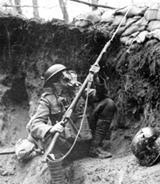Mustard Gas
Mustard gas can cause bodily damage and has been used primarily as a chemical weapon, during combat in World War I and World War II, and during the Iran-Iraq war in the 1980s.
Some Operation Iraqi Freedom service members who demolished or handled explosive ordinance may have been exposed to mustard agents.

If you have health concerns, talk to your health care provider or contact your local VA Environmental Health Coordinator to help you get more information from a health care provider.
What mustard gas is
Mustard gas belongs to a class of organic compounds that include sulfur mustard (Yperite) and nitrogen mustard. Lewisite is an arsenic-containing agent in this class.
As gases, these agents appear yellow-brown in color and smell like mustard, garlic, or horseradish. In pure form at room temperature, they are thick and almost-odorless liquids.
Mustard gas experiments
In the 1940s, the Department of Defense recruited "volunteer soldier" subjects for experiments using mustard agents to evaluate clothing, ointments and equipment to protect American troops from mustard agent attacks.
- Nearly 60,000 military personnel were involved in a wide range of exposures, most of them participating in mild exposures (a drop of agent on the arm in "patch" tests).
- About 4,000 soldiers were subjected to severe, full-body exposures as a part of field exercises over contaminated ground areas.
Since the early 1990s, VA has conducted outreach efforts to reach Veterans identified by the Department of Defense as participants in these tests and inform them about their benefits.
Health concerns?
If you are concerned about health problems associated with exposure to mustard gas during your military service, talk to your health care provider or contact your local VA Environmental Health Coordinator to help you get more information from a health care provider.
VA offers a variety of health care benefits to eligible Veterans. Not enrolled in the VA health care system? Find out if you qualify.
Medical Care Available: The U.S. Army is now providing medical care to Veterans who served as volunteers for research involving chemical and biological testing between 1942 and 1975 and who have an injury or disease proximately caused by their participation in this testing. As many as 60,000 Veterans volunteered for medical research in order to contribute to the advancement of the U.S. Biological and Chemical Programs. The Army will assist Veterans in obtaining medical care through military treatment facilities. Eligible Veterans are encouraged to please visit the U.S. Army website for more information, or call 1-800-984-8523 if they have any questions or need assistance.
Compensation benefits for health problems
Service connection may be granted by presumption for disabilities which are due to mustard gas or lewisite exposure. To qualify, Veterans must have had full body exposure during active military service. Conditions considered presumptive for exposure to mustard gas or lewisite are:
- Chronic conjunctivitis, keratitis (inflammation of the cornea), corneal opacities, and scar formation.
- Acute nonlymphocytic leukemia, nasopharyngeal cancer; laryngeal cancer; lung cancer (except mesothelioma), and squamous cell carcinoma of the skin.
- Chronic laryngitis, bronchitis, emphysema, asthma, and chronic obstructive pulmonary disease.
Veterans may file a claim for disability compensation for these or other health problems that they believe are related to exposure to mustard gas during military service. For conditions not listed above, VA decides these claims on a case-by-case basis. File a claim online.
Learn more about VA benefits.




















